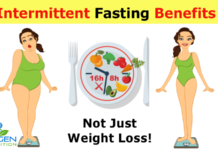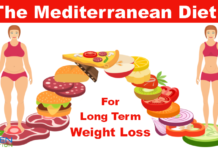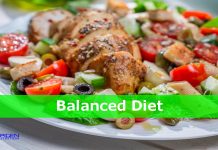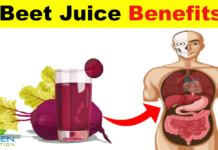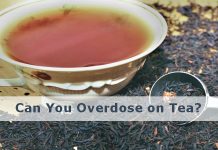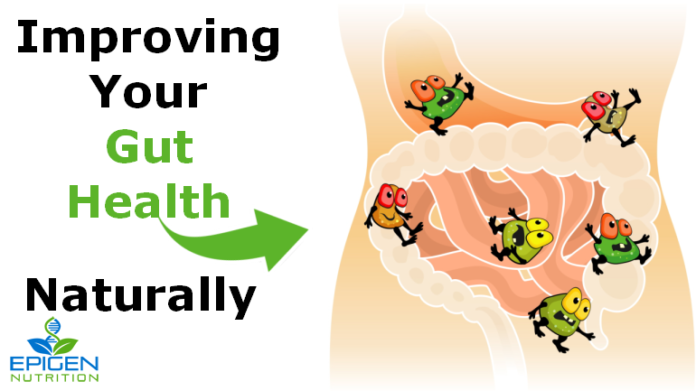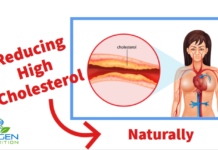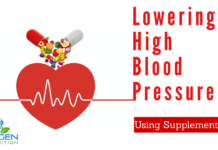Problems with digestive issues has long been the brunt of many jokes.
However, having to deal with the challenge of how to improve gut health is not really a laughing matter.
Constipation, irritable bowel syndrome, excess gas and bloating are just a few of the tell-tale signs of poor gut health.
And poor gut health can also be linked to various other health issues.
Like autoimmune diseases, which include sleep problems, thyroid issues, fluctuating weight, fatigue, and even depression.
The gastrointestinal tract is made up of microbes and bacteria.
Having a healthy gut indicates that it mainly contains the good bacteria we need to help with digestion, plus balance the hormones and ward off nasty infections.
How to Improve Gut Health with Supplements
Apart from our diet, we can help to support our gut health by taking supplements.
Here are 7 gut health supplements to help maintain the balance in your digestive system, and also assist in reducing bloating along with improving your gut health.
Probiotics and Prebiotics
A healthy gut needs a healthy balance between bacterial populations.
If the amount of harmful bacteria exceed the more beneficial bacteria, you can suffer from a gut microbiome imbalance which can cause abdominal discomfort and bloating.
Probiotics contain good bacteria that can help the digestive system.
So, eating probiotic foods, or taking probiotic supplements, can help with balancing the gut microbiome, and lead to a healthier digestive system.
A number of people get confused with the difference between probiotics and prebiotics.
Probiotics are good bacteria, and prebiotics are the fiber rich foods that probiotics need to thrive and multiply.
So in effect, more probiotics equals improved gut health.
Prebiotics are beneficial to help maintain a healthy number of good bacteria in the gut.
You can choose to take probiotic supplements, or you can take a combined probiotic and prebiotic supplement, depending on what your needs are.
Ginger
Ginger is widely known for its anti-inflammatory properties, making it of benefit for not only arthritis but in relieving digestive problems and bloating.
This powerful antioxidant can increase the metabolic rate of people that are suffering from indigestion.
It can also lower inflammation in the gut, which can instigate irritable bowel syndrome.
Ginger Root Supplements can be found in capsule and tablet form, but if you are not able to take tablets, there are some syrups and teas which are available too.
L-glutamine
L-glutamine is an amino acid that works in a number of manners.
One of the ways is to help repair the intestinal lining, which contributes to having a healthy digestive tract.
It is also known to promote the growth of good bacteria in the gut and can help fight off cell oxidation, due to it also being a powerful antioxidant.
We already produce L-glutamine naturally, but if your body requires more, taking L-glutamine supplements can further boost its function.
A quick word of caution here, taking too much L-glutamine is not recommended as it can lead to a leaky gut, so make sure that you are only taking it if you need extra supplementation, and then only the required or recommended dosage.
Digestive Enzymes
Digestive enzymes are the components that work hard to digest and break down the nutrients in the food we eat.
These enzymes can be found in our mouth, stomach, and intestines, and we naturally produce them to help make sure we have maximum nutrient absorption.
Not having enough digestive enzymes in the body can lead to bloating, gas, and indigestion issues.
If we don’t produce enough digestive enzymes, we will probably be missing out on essential nutrients from our diet, which can lead to extra health issues.
Taking supplements with digestive enzymes can help make sure that our digestive system is doing the job it is supposed to do.
Vitamin D
Vitamin D, sometimes referred to as the sunshine vitamin, is not normally associated with digestion, however, it is beneficial to our gut health.
Vitamin D can help to relieve the symptoms of irritable bowel syndrome (IBS).
It can also help with improving other gastric issues such as bloating, stomach pain and gas.
Psyllium
Psyllium is a form of soluble fiber that is known for supporting digestion.
This prebiotic helps to relieve constipation, by trapping water in our intestinal tract and increasing the bulk of the stool, in turn making our bowel movements easier and more regular.
As a prebiotic, psyllium can also aid in increasing the good bacteria present in your gut and lessen instances of indigestion and bloating.
Gut health goes beyond just ensuring our digestive system functions properly.
It is closely linked to our immune system, overall health and nutrient absorption.
So making sure that our gut stays healthy, is one way to take care of our body and help it stay in the best of health.











